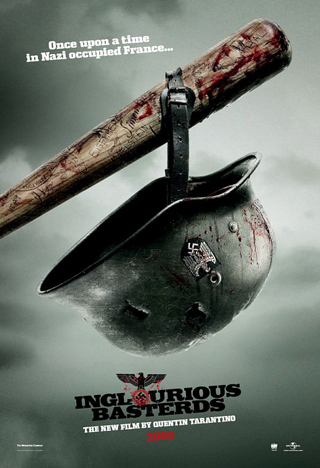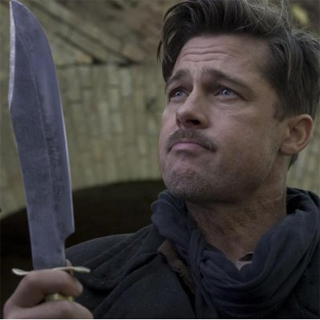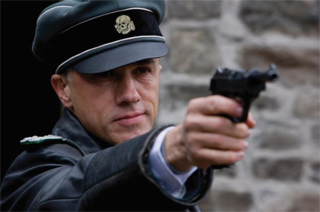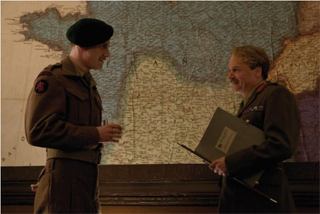|
Inglourious
Basterds
War is hell,
sure, but then why are war movies entertaining as hell?
Maybe that, too, is a fallacy, as the past couple of decades
have brought us films that deconstructed the mythos of the
American soldier, showing the fear and the grit through
a lens of grey.
Then along comes
Quentin Tarantino, once again reconstructing the exaggerated
black and white surety of the grindhouse movies of his childhood.
Except that even in his smugness, Tarantino's talent won't
allow him to make it that simple.
On
the surface, Inglourious Basterds looks like a bizarre
revenge fantasy. Brad Pitt "stars" as Lieutenant Aldo Raine,
a Kentucky soldier tasked with creating a squad of Jewish-American
soldiers to rain terror down on the "Naatzis." Oh, it never
happened, but there is something naggingly cool about the
idea, and Pitt is a ghoulish and hilarious leader of this
high concept squadron; it could only be a movie.
And that's what
Tarantino seems to really be about, making a World War II
movie that constantly reminds the viewer that it is, in
fact, only a movie, while fighting with his own instinct
to actually try and make some sort of important statement
disguised as junk. More than just a movie invention, the
Basterds (misspelled on Raine's rifle butt) don't even get
to drive the heart of this film.
Instead, Tarantino
treats them as outside forces, occasionally flashing over
to them when a character in the real story mentions something
about them. Though fun, they're not really all that interesting,
all one-note stereotypes played for violent comedy even
when the stakes are high. Three of the Basterds just disappear
from the movie, as if Tarantino himself couldn't be bothered
to remember who they are.
The complex
characters, the ones we really care about, are locked in
a cat and mouse game. It's easy to find sympathy and admiration
for Shoshanna Dreyfus (Melanie Laurent), whose family is
killed by German soldiers in the excruciatingly tense opening
scene. Even as she runs from Col. Hans Landa (Christoph
Waltz), it's staged for maximum drama instead of reality,
staying out in the open so Landa can ponder whether or not
he will shoot her in the back.
What's
surprising is how magnetic Landa turns out to be --and Waltz
is suddenly at the age of 52 an actor to watch. He's something
other than a villain we enjoy; there's something strangely
reasonable to him. What's evil inside him is cold and small;
he's just a man exceeding expectations at his job, and his
job happens to be abetting genocide. Tarantino allows for
ugly leering Nazis in portraying Josef Goebbels and Hitler
himself, yet he keeps focusing on Germans we could almost
empathize with before remembering which side they're on
and what they've at best turned a blind eye to.
For four years
after Shoshanna's escape, she finds herself the object of
a young German soldier's affection. She now runs a cinema
in Paris, and the baby-faced Fredrick Zoller (Daniel Bruhl)
has become instantly smitten with her. At first she resists
his attentions, until she realizes that Zoller could be
the key to avenging her family.
He's a war hero
being made by Goebbels into a movie star, and Bruhl will
never settle down long enough to determine whether or not
the young man feels guilty about what he's done. Complex
and charming, it would almost be satisfying if Shoshanna
actually did fall for him.
All the while,
Tarantino employs cinematic tricks to remind us, it's only
a movie anyway, and any emotion we feel will be false. In
his bravura opening, Tarantino plays with the convention
of films that start in foreign languages and then find a
trick to transfer over to English for the rest of the film.
He finds a hilarious and obviously contrived variation and
runs with it. Yet later he reverts to French and German
with subtitles, because the trick just won't work anymore.
At least a third of this movie isn't in English,
nor could it logically be.
Even when he
wants us swept up in his artistry, Tarantino dances back
into believability. Scene after scene builds in suspense.
Tarantino likes creating long well-written conversations
that we know are only going to end in violence, and yet
they keep on going until something or someone explodes.
Often they're conversations about the pop culture of the
forties, the writer cleverly parodying himself.
Then he'll throw
Mike Meyers in a cameo appearance as a British soldier (with
Rod Taylor - where has he been? - lurking as Winston Churchill).
Suddenly we're almost in a Richard Lester war satire, before
being jerked back into Tarantino's compelling human drama.
And then the Basterds come in and beat the crap out of everybody
for a while.
It's not a frustrating
film, far from it. A lot more focused in intent than Kill
Bill and much more satisfying than Death Proof,
Inglourious Basterds pulls us along to a giddy conclusion.
Yet it's hard to tell which Tarantino thinks is losing their
moral grip - himself or us. Does he want us to be horrified
by the violence of Eli Roth as "the Bear Jew," who beats
Nazis to death with a baseball bat, or should we just roar
along with him at the catharsis of the fantasy?
Tarantino may
be questioning our love of cinematic violence even as he
exults in it. Ultimately, Inglourious Basterds is
chasing its own tail while waving it in our faces. Mixing
high and low art, the writer/director has returned to the
promise of his early days, but it's still hard to tell if
he's used his admittedly prodigious talents to make a truly
great film. I guess I'm going to have to see it again to
be sure.
|









